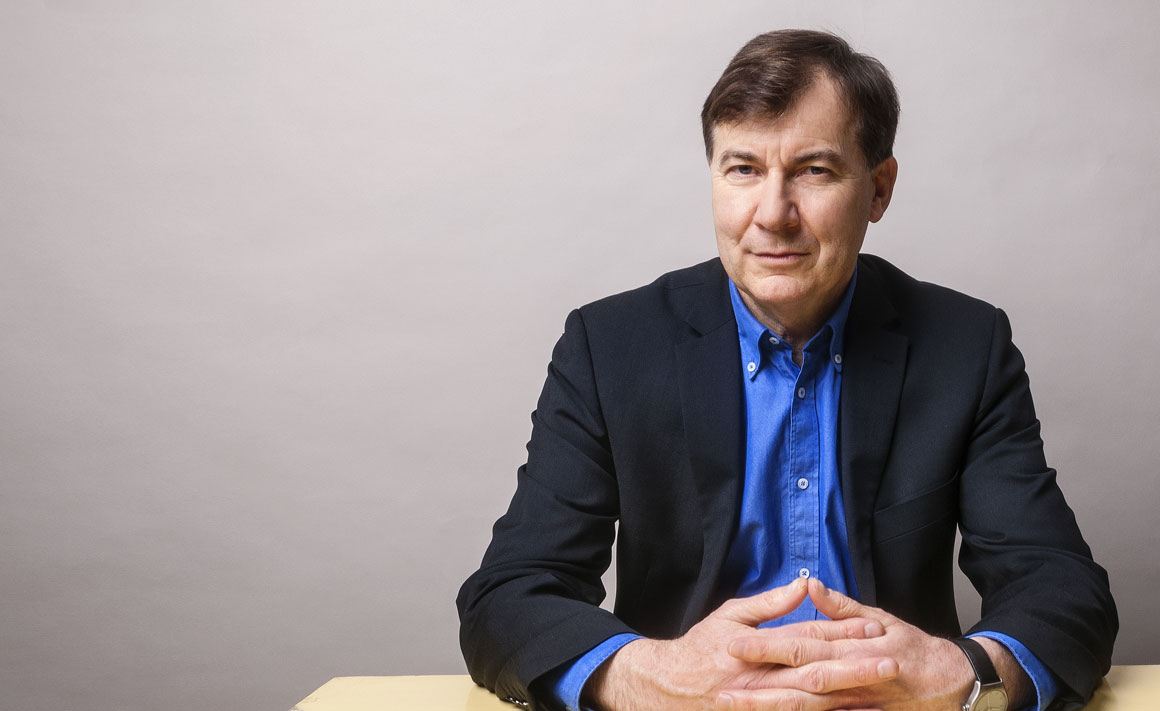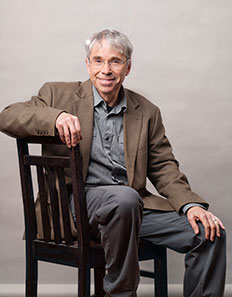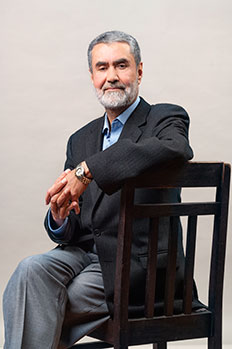
After years of research and on-the-ground experience, experts from Otago's Department of Politics are helping their students – and the wider world – make sense of Middle East politics.
Professor Robert Patman, Professor Bill Harris and Dr Najib Lafraie “work” on what is arguably the most politically sensitive region in the world.
All members of Otago's Department of Politics, Patman specialises in great-power foreign policy in relation to the Middle East; Harris has a particular interest in Lebanon, Syria, Iraq, Turkey, and Arab-Israeli affairs; and Lafraie has a focus on Islamic militancy and Afghanistan.
England-born Patman, who is the Professor of International Relations and current Head of Department, completed a PhD at the University of Southampton on Soviet involvement in the Horn of Africa, learning the Russian language in the process. He joined the staff at Otago in 1991.
Patman says that his attraction to the Middle East arose from his interest in Soviet and United States foreign policy, and the proximity to, and importance of, the Horn of Africa to the region.
New Zealand-born Harris attended the University of Canterbury and then completed a PhD at Durham University on Israeli settlement policy and the fate of Palestinian refugees who went to Jordan. He started teaching in the Department of Geography at Otago in 1990 before switching to Politics in 2000.

Professor Bill Harris
Harris has been a frequent visitor to the Middle East, including a stint teaching at University College in Beirut, where he met his Lebanese wife. His two most recent visits were to war-torn northern Iraq to talk with people about the effect of ISIS on the region.
The wary silence from his Kurdish military companions during a 14-kilometre drive through open territory following a visit to the strategically important Mosul Dam reinforced the potential danger of the situation. “That certainly sharpens up how you view the area,” Harris comments.
He believes that it is important to gain first-hand experience of the region. “As you go from one person to another, you get these different perspectives of things; you would have much less chance of getting the nuances of people's perspectives from sitting outside.
“There is also a credibility issue here. I think that if one can demonstrate that one has been on the ground, one has more credibility than simply sitting here and looking at Arabic newspapers.”
Part of his background research has included learning Hebrew, Arabic and the Turkish language.
Afghanistan-born Lafraie studied politics at Kabul University and then at the University of Hawai'i. He interrupted his studies in Hawai'i in 1980 to join the resistance movement, based in Pakistan, in the fight against the Soviet occupation of Afghanistan.
On completion of his PhD, on the ideology of the Islamic Revolution in Iran, he returned to Pakistan and became the Minister of Information in the Afghan government-in-exile from 1989, and the Minister of State for Foreign Affairs from 1992 to 1996 following the withdrawal of Soviet troops and the ousting of the communist regime in Kabul.

Dr Najib Lafraie
“A political and administrative job was not to my liking, but I felt an obligation to do something against the foreign invasion of my country,” Lafraie explains.
When the Taliban captured Kabul, Lafraie and his wife and four children went into hiding and then fled to Pakistan and on to New Zealand as refugees.
Lafraie was in Christchurch in 2002, training to be a secondary school teacher, when Patman heard him speaking about Afghanistan on the radio and arranged for him to teach short-term part-time at Otago, which led to a full-time position.
Lafraie says that his political background has helped him a lot in understanding what is happening in the wider region. He has no concerns in moving from partisan politician to university academic.
“Claiming objectivity is a mirage,” Lafraie asserts. “You can never be objective because always, whether you are conscious of it or not, you will bring your biases with you to any work that you do. So, what is important is to be conscious of your biases, to be open about them and to try to be as honest in conducting your research and presenting its results as humanly possible.”
Patman, Harris and Lafraie each teach in their specialist areas at Otago and have written related books and journal articles, given conference addresses and contributed opinion pieces to New Zealand and overseas magazines and newspapers.
They are popular speakers and regular media go-to people, sought out for their expert political commentary and clear views, all believing that it is important to contribute to a wider public understanding of what is happening in the Middle East.
“I feel that professional academics do have a responsibility to engage with the wider public because we have the privilege of time to reflect on these issues,” Patman says.
“Many people, particularly in New Zealand, are genuinely interested in what's going on in the world but they have busy lives and they are often confronted with disconnected international information, sometimes information which is very important to New Zealand. What we often don't get is the connecting lines that make sense of this information. Our role is to provide analysis and interpretation which helps demystify events for people in an accessible way.”
WHAT ARE THEY SAYING?
Professors Robert Patman and Bill Harris, and Dr Najib Lafraie share a broad view of why the Middle East is such a problematic region: inherent divisions between Jews and Arabs, and between Sunni and Shia Muslims, compounded by self-interested interference from the great powers.
The three are teachers, not fortune-tellers, but point to various potential solutions to the problems facing the Middle East. Immediate measures include getting rid of the Syrian president, Bashar al-Assad, and his regime.
Harris places responsibility for the deaths of a quarter of a million Syrians since 2011, directly or indirectly, with al-Assad.
“He and his entourage made the critical decision for escalation of armed force and relentless brutality against protestors in early 2011. Most of what we see now, including the desperate rush of Syrian refugees toward Europe, stems from that decision and from the Syrian regime's ruthless further development of it,” he says.
“The mess Bashar initiated will not suddenly go away with his removal, but there will certainly be no end to the misery as long as he remains.”
Lafraie considers the complete withdrawal of foreign troops from Afghanistan and negotiations with the Taliban as a way forward for that country. He notes that the Taliban have become a fact of life, assuming the role of a “national liberation” movement and cannot be wished away.
“The US and its NATO allies cut their costs by withdrawing the bulk of their troops by the end of 2014. However, the continuous presence of about 13,000 foreign troops has given the Taliban the excuse to continue and expand their military operations.”
“President Obama announced in May 2014 that by 2016 all American troops would be out of Afghanistan, but he seems to be under pressure by the Pentagon and some Republicans to reconsider that decision.”
Lafraie believes that would mean indefinite continuation of the war in Afghanistan. “Conversely, if that promise is used as a bargaining chip, it may lead to a peaceful settlement – and the Taliban have shown an interest in such a settlement in the past,” he says.
Longer-term measures include finding a just solution to the Palestinian problem, and implementing multifaceted strategies to deal with the root causes of Islamic extremism and not simply its symptoms.
Patman is particularly convinced of the need to introduce a much more effective international organisation to deal with problems that great powers are incapable of solving alone, starting with the removal of the veto power of the permanent members of the United Nations Security Council.
However, he expresses a cautious optimism about the region's future.
“I do think that the problems are solvable, but tough decisions on recognising a Palestinian right to a state and curbing the use of veto power in the Security Council cannot be fudged indefinitely.”
Watch Professor Robert Patman on YouTube
Foreign Policy School
The annual University of Otago Foreign Policy School has become THE event in the New Zealand international relations calendar.
First held 50 years ago, the school has brought to the Otago campus nationally and internationally renowned experts on topics from disarmament, to the rise of China as an economic power; from the ethics of foreign policy, to science diplomacy.
It has hosted speakers from Robert Watson (former chair of the Intergovernmental Panel on Climate Change, discussing food security) to Professor Shen Dingli (on China's nuclear and space programme); from Ong Keng Yong (former Secretary-General of ASEAN), to former Fiji Prime Minister Major-General Sitiveni Rabuka.
It has alternated between exploring local issues, such as the impact on New Zealand of the growing Asian economies (1975) and this country's evolving international relations (2015), to grappling with global debates like the relative power of the nation-state (1996) and resource scarcity (2014).
The papers presented at the school are then fashioned into significant books, produced by leading international publishers.
A feature has been a focus on issues “ahead of the wave”, anticipating and exploring trends that will become of growing importance to policy-makers: for example, New Zealand in the world economy (1984), security in the post-Cold-War world ( 1997), sport and foreign policy (2006) and the Middle East's unfolding dreams and drama (2012).
Professor Bill Harris says the school provides an opportunity for examining and debating a wide spectrum of ideas.
“This takes into account the latest critical academic exploration of issues, alongside the reality of those working on the ground, as well as a gauge on public opinion.”
The brainchild of then University Extension lecturer Arnold Entwistle, the school was originally held as a small weekend seminar, but today regularly attracts between 100 and 150 participants.
At least 25 per cent of these attendees are generally staff from the Ministry of Foreign Affairs and Trade with the Minister usually formally opening the event.
While the Department of Politics is now responsible for ensuring the school's ongoing success, over the past half a century its directors have come from across the University, including Economics, Physical Education, History, Psychology, Anthropology, Geography, Science Communication and the Centre for Sustainability (CSAFE).
FUNDING
- University of Otago
Professor Robert Patman:
- Fulbright Senior Scholar Award
- Peace and Disarmament Education Trust
